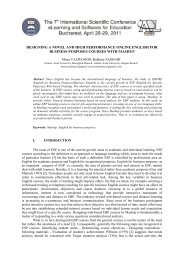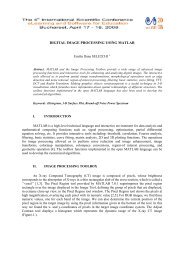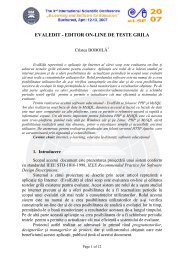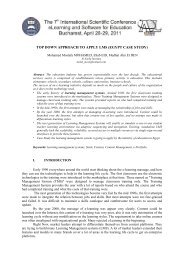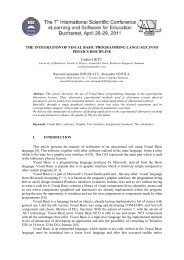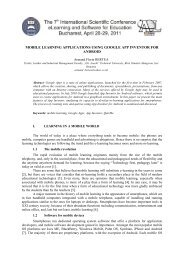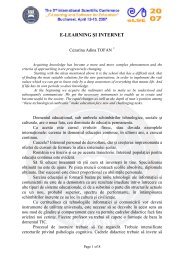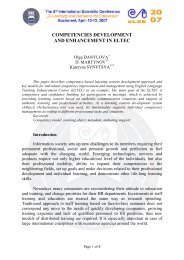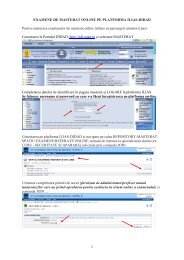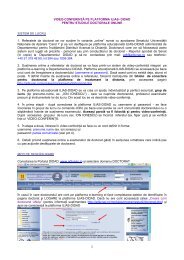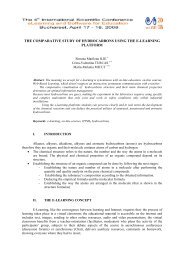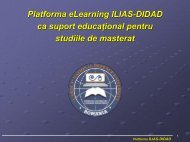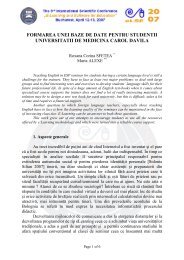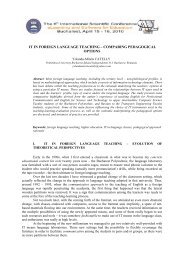tools for learning and development of entrepreneurial competencies
tools for learning and development of entrepreneurial competencies
tools for learning and development of entrepreneurial competencies
You also want an ePaper? Increase the reach of your titles
YUMPU automatically turns print PDFs into web optimized ePapers that Google loves.
usiness contacts to the newcomers. This creates a solid operational context <strong>for</strong> simulation <strong>and</strong><br />
students integrate in a more complex environment that allows them to get closer to real life situations.<br />
The traditional role <strong>of</strong> the teacher, within practice firms, changes <strong>and</strong> the educational priorities become<br />
more obvious.<br />
The practical training can be based on three design models:<br />
- The <strong>learning</strong> <strong>of</strong>fice; simulation <strong>of</strong> economic activities based on a closed didactic<br />
model;<br />
- The practice firm, a model <strong>of</strong> simulation <strong>for</strong> the real economic process in a real<br />
company;<br />
- The junior firm, activates in the store, laboratory, consultancy <strong>of</strong>fice in the school.<br />
In order to carry out the processes required within a training firm, it is necessary to provide a<br />
laboratory with the economic, theoretical <strong>and</strong> practical conditions students need to activate. In this<br />
environment, the training firm:<br />
- Carries put its activity as a real company, but with virtual goods <strong>and</strong> money,<br />
according to the national legislation in <strong>for</strong>ce;<br />
- Implement knowledge on a real working place, under the methodological management<br />
<strong>of</strong> the teacher;<br />
- Carries out the connection between the educational <strong>and</strong> the pr<strong>of</strong>essional environment;<br />
- Provides the opportunity to involve experts from the practical area;<br />
- Eliminates important problems that would have appeared based on wrong decisionmaking,<br />
if operating in a real environment.<br />
- realizează legătura între şcoală şi mediul pr<strong>of</strong>esional;<br />
2.2 Educational purpose <strong>and</strong> tasks <strong>of</strong> training firms<br />
The teachers play a crucial role in preparing the Company or throughout the exercise. They<br />
must have skills <strong>and</strong> knowledge <strong>of</strong> commerce <strong>and</strong> management. Diverse training firms are consultants<br />
<strong>and</strong> organizers <strong>of</strong> the training process <strong>and</strong> must master the principle <strong>of</strong> the practice-oriented training.<br />
They <strong>of</strong>fer consultations <strong>and</strong> foster independence in training firms, verify the knowledge <strong>and</strong> skills<br />
acquired by students, motivate, activate <strong>and</strong> guide the work <strong>of</strong> students.<br />
The teachers sustain students to assume responsibilities, to make decisions, to participate<br />
within the team, to think critically, to solve unexpected problems that might occur. The teachers act<br />
both like active moderators <strong>and</strong> co-participants. They will encourage self-management, initiative <strong>and</strong><br />
students’ self-evaluation, <strong>and</strong> boost work team. They will be both consultants <strong>and</strong> instructors, acting<br />
towards the immediate improvement <strong>of</strong> work <strong>and</strong> solving conflict situations.<br />
Working in a training firm brings new opportunities <strong>and</strong> challenges <strong>for</strong> teachers as well:<br />
- Teamwork requires qualities such as responsibility, organizational skills, exactness,<br />
precision, accuracy, conflict-solving skills.<br />
- Training firms involve knowledge from various domains <strong>of</strong> activity, such as<br />
accounting, law, in<strong>for</strong>mation technology, or social science, <strong>and</strong> this is a dem<strong>and</strong>ing<br />
work that implies the teacher must have extra knowledge in these fields.<br />
- Training firms study <strong>and</strong> apply the norms .established <strong>for</strong> its activity (laws,<br />
government decisions, emergency government decisions <strong>and</strong> so on); the teacher must<br />
constantly update his/ her knowledge.<br />
- By simulating real situations, the students become aware <strong>of</strong> the specific objectives <strong>of</strong><br />
enterprises, <strong>and</strong> they underst<strong>and</strong> its organization structure. This requires that the<br />
teacher maintains a close relationship with the real enterprise correspondent to the<br />
virtual one.<br />
- The role the teacher is different. S/he supports the activity, coordinates <strong>and</strong> controls it.<br />
This makes his/ her work more complex <strong>and</strong> difficult, but also more interesting.<br />
The training firms implies the use <strong>of</strong> diverse methodologies, <strong>of</strong> simulation, individual <strong>and</strong><br />
team work, imaginary discussions, presentations <strong>and</strong> case studies. The experience <strong>of</strong> students <strong>and</strong><br />
teachers within the firm <strong>of</strong> exercise resulted in numerous awards received by the Economic College<br />
"Ion Ghica" Târgovişte at international expositions concerning training firms.



